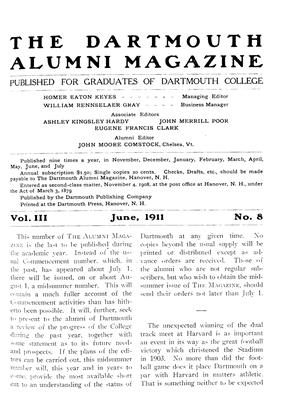One of the most important regulations passed by the Dartmouth faculty in recent years is that put upon the records at the April meeting of that body. The new regulation, which is aimed to improve the standards of undergraduate work, provides that "seniors and juniors be not allowed credit towards a degree for more than twelve semester hours of work per year, or sophomores and freshmen for more than fifteen hours, passed with grade below 60 per cent." Or, to put the matter somewhat less technically, beginning with next year a student must gain 60 per cent in at least half his work if he hopes to obtain the Dartmouth degree. More latitude is allowed to freshmen and sophomores than to upper classmen, for two reasons; a larger proportion of the work for the men of these two years is required than for those of the two succeeding years; and, further, investigation shows conclusively that the methods of study of upper classmen are, in general, better than those of their often ill-trained juniors.
The purpose of the regulation is clear enough; it should serve further to protect the Dartmouth degree, by preventing its bestowal upon the lazy or the incompetent. It is well enough, no doubt, to make reasonable allowance for men who, for disciplinary reasons, are obliged to take courses which to them are unusually difficult or distasteful. Fifty per cent, which generally implies some fragmentary knowledge, pale glimmerings of understanding here and there in a student's work, is certainly the least that any self-respecting institution can accept from anyone in anything. That student, however, who can not reach 60 per cent in half his work should hardly be classified among the intellectuals who may be judged worthy of an academic degree. The supposition, however, upon which the regulation is based is rather that the average undergraduate is more liable to, laziness than incompetence, and that the necessity for gaining a higher mark in some things will stimulate him to gaining higher marks in all; and hence, that in the process his thinking apparatus will receive beneficial exercise.
 View Full Issue
View Full Issue
More From This Issue
-
 Article
ArticleTHE MAY CONFERENCE OF HISTORY TEACHERS
June 1911 By Sidney B. Fay -
 Article
ArticleThis number of THE ALUMNI MAGAZINE
June 1911 -
 Article
ArticleMEETING THE PROBLEM OF COLLEGE ATHLETICS
June 1911 By W. Huston Lillard 1905 -
 Class Notes
Class NotesLOCAL ASSOCIATIONS
June 1911 -
 Article
ArticleThayer and Tuck Graduations
June 1911 -
 Article
ArticleMedical Graduates Placed
June 1911
Article
-
 Article
ArticleOUTING CLUB ANNOUNCES WINTER CARNIVAL PROGRAM
February, 1923 -
 Article
ArticleAlumni Association Meeting
AUGUST 1930 -
 Article
ArticleFaculty Notes
November 1944 -
 Article
ArticleHanover Holiday Reading List
May 1946 -
 Article
ArticleEleven Make Art Gifts To Dartmouth Collection
March 1955 -
 Article
ArticleClayt Claflin: Incomparable Character
DECEMBER 1972 By JOHN D. TALBOTT '67

